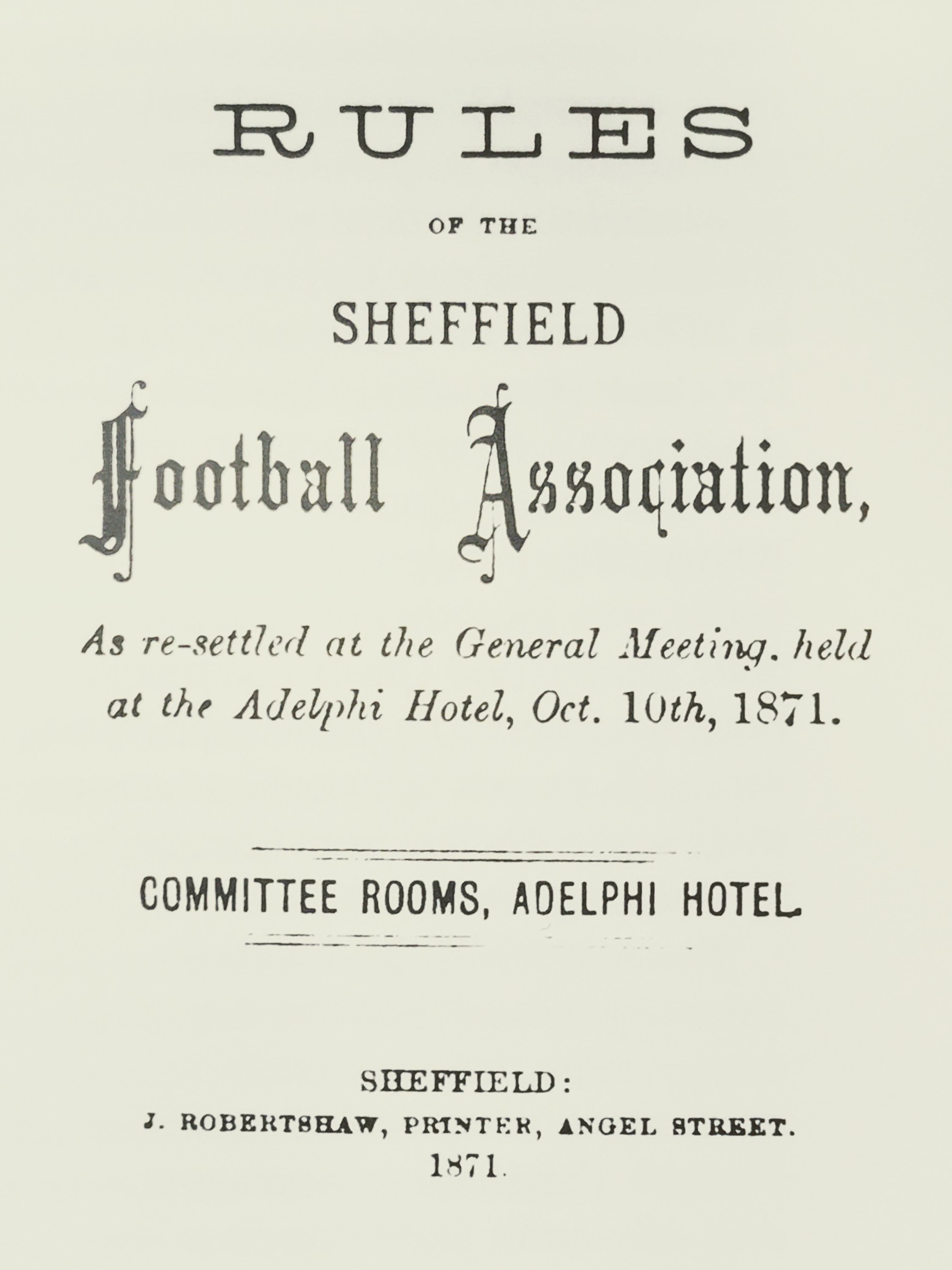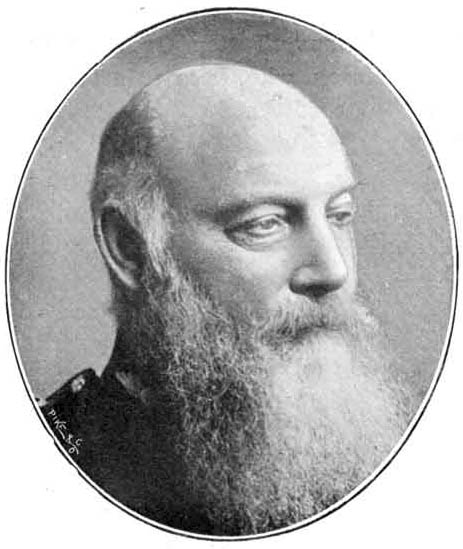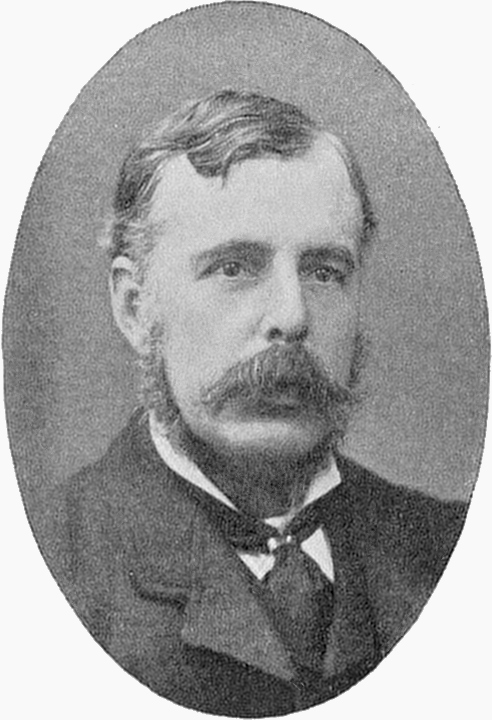|
Sheffield Rules
The Sheffield Rules was a code of football devised and played in the English city of Sheffield between 1858 and 1877. The rules were initially created and revised by Sheffield Football Club, with responsibility for the laws passing to the Sheffield Football Association upon that body's creation in 1867. The rules spread beyond the city boundaries to other clubs and associations in the north and midlands of England, making them one of the most popular forms of football during the 1860s and 1870s. In 1863, the newly formed London-based Football Association (FA) published its own laws of football. Between 1863 and 1877, the FA and Sheffield laws co-existed, with each code at times influencing the other. Several games were played between Sheffield and London teams, using both sets of rules. After several disputes, the two codes were unified in 1877 when the Sheffield FA voted to adopt the FA laws, following the adoption of a compromise throw-in law by the FA. The Sheffield rules ... [...More Info...] [...Related Items...] OR: [Wikipedia] [Google] [Baidu] |
Sheffield FC
Sheffield Football Club is an English football club from Sheffield, South Yorkshire, although now based in nearby Dronfield, across the county boundary in Derbyshire. They currently compete in the . Founded in October 1857,7 OLDEST FOOTBALL CLUBS: WHERE ARE THEY NOW? by Alfie Potts Harmer on HITC website, 2019 the club is recognised by as the oldest existing club still playing football in the world. Sheffield FC initially played games under the |
Derbyshire
Derbyshire ( ) is a ceremonial county in the East Midlands, England. It includes much of the Peak District National Park, the southern end of the Pennine range of hills and part of the National Forest. It borders Greater Manchester to the north-west, West Yorkshire to the north, South Yorkshire to the north-east, Nottinghamshire to the east, Leicestershire to the south-east, Staffordshire to the west and south-west and Cheshire to the west. Kinder Scout, at , is the highest point and Trent Meadows, where the River Trent leaves Derbyshire, the lowest at . The north–south River Derwent is the longest river at . In 2003, the Ordnance Survey named Church Flatts Farm at Coton in the Elms, near Swadlincote, as Britain's furthest point from the sea. Derby is a unitary authority area, but remains part of the ceremonial county. The county was a lot larger than its present coverage, it once extended to the boundaries of the City of Sheffield district in South Yorkshire where it cov ... [...More Info...] [...Related Items...] OR: [Wikipedia] [Google] [Baidu] |
Throw-in
A throw-in is a method of restarting play in a game of association football when the ball has exited the side of the field of play. It is governed by Law 15 of The Laws of the Game. Award When the ball goes out of play past the touch-line to the side of the pitch, a throw-in is awarded to the opponents of the player who last touched the ball, whether deliberately or accidentally. Procedure The throw-in is taken from the point where the ball crossed the touch-line, either on the ground or in the air, though typically a referee will tolerate small discrepancies between the position where the ball crossed the touch-line and the position of the throw-in. Opposing players may not approach closer than to the point on the touch-line from which the throw-in is to be taken. At the moment of delivering the ball, the thrower must face the field of play. The thrower must have part of each foot on the touch-line or on the ground outside the touch-line, and use both hands to deliver th ... [...More Info...] [...Related Items...] OR: [Wikipedia] [Google] [Baidu] |
Adelphi Hotel (Sheffield)
The Adelphi Hotel was a hotel in the centre of the city of Sheffield, England. It was connected with the founding of three major sports teams: Yorkshire County Cricket Club (1863), Sheffield Wednesday (1867) and Sheffield United (1889). The Sheffield Football Association was also formed at the hotel. In 1854 a public meeting was held at the hotel where it was announced that a cricket ground would be built on Bramall Lane. This ground was later used to host Sheffield Wednesday matches and eventually became the permanent home of Sheffield United. The hotel was demolished in 1969 to make way for the Crucible Theatre The Crucible Theatre (often referred to simply as "The Crucible") is a theatre in Sheffield, South Yorkshire, England which opened in 1971. Although it hosts regular theatrical performances, it is best known for hosting professional snooker's m .... References Hotels in Sheffield Defunct hotels in England History of Sheffield Sheffield United F.C. Sheffie ... [...More Info...] [...Related Items...] OR: [Wikipedia] [Google] [Baidu] |
Solicitor
A solicitor is a legal practitioner who traditionally deals with most of the legal matters in some jurisdictions. A person must have legally-defined qualifications, which vary from one jurisdiction to another, to be described as a solicitor and enabled to practise there as such. For example, in England and Wales a solicitor is admitted to practise under the provisions of the Solicitors Act 1974. With some exceptions, practising solicitors must possess a practising certificate. There are many more solicitors than barristers in England; they undertake the general aspects of giving legal advice and conducting legal proceedings. In the jurisdictions of England and Wales and in Northern Ireland, in the Australian states of New South Wales, Victoria, and Queensland, Hong Kong, South Africa (where they are called '' attorneys'') and the Republic of Ireland, the legal profession is split between solicitors and barristers (called ''advocates'' in some countries, for example Scotland), ... [...More Info...] [...Related Items...] OR: [Wikipedia] [Google] [Baidu] |
Sheffield Collegiate School
Sheffield Collegiate School began in 1836 in new buildings on the corner of Ecclesall Road and Collegiate Crescent (now Grade II listed and part of Sheffield Hallam University). The school enjoyed academic success but lacked sound finances and was taken over by Sheffield Grammar School in 1884, to become Sheffield Royal Grammar School (SRGS) in 1885. In 1905 Sheffield City Council acquired both Wesley College and SRGS and they were merged on the site of the former to form King Edward VII School (KES), named after the reigning monarch. Headmasters of Sheffield Collegiate School Notable alumni of Sheffield Collegiate School * John Cordeaux (1831–1899) – ornithologist * Nathaniel Creswick (1826–1917) – co-founder of Sheffield F.C. and the Sheffield Rules * Henry Jackson (1839–1921) – Regius Professor of Greek at the University of Cambridge * George Rolleston (1829–1881) – Linacre Professor of Anatomy and Physiology at the University of Oxford * Henry Clif ... [...More Info...] [...Related Items...] OR: [Wikipedia] [Google] [Baidu] |
Yorkshire
Yorkshire ( ; abbreviated Yorks), formally known as the County of York, is a Historic counties of England, historic county in northern England and by far the largest in the United Kingdom. Because of its large area in comparison with other English counties, functions have been undertaken over time by its subdivisions, which have also been subject to History of local government in Yorkshire, periodic reform. Throughout these changes, Yorkshire has continued to be recognised as a geographic territory and cultural region. The name is familiar and well understood across the United Kingdom and is in common use in the media and the Yorkshire Regiment, military, and also features in the titles of current areas of civil administration such as North Yorkshire, South Yorkshire, West Yorkshire and the East Riding of Yorkshire. Within the borders of the historic county of Yorkshire are large stretches of countryside, including the Yorkshire Dales, North York Moors and Peak District nationa ... [...More Info...] [...Related Items...] OR: [Wikipedia] [Google] [Baidu] |
William Prest
William Prest (1 April 1832 – 10 February 1885) was a cricketer and footballer born in York. He lived most his life in Sheffield where he went on to become co-founder of Sheffield Football Club and captained Sheffield Cricket Club (''aka'' Yorkshire). He was also involved with the formation of a local regiment, the Hallamshire Rifles, with which he served for most of his life. William was son of John and Arabella Prest and moved with them to Sheffield when his brother John Beevor Prest bought a wine business. There he became a noted cricketer and played cricket for Sheffield 16 times between 1852 and 1862. He scored 286 runs at an average of 10.21 as a batter and got at total of 3 wickets for 69 runs as a bowler. All 3 wickets came in the same match. In the winter of 1854, Prest attended the meeting at the Adelphi Hotel in Arundel Gate when the Sheffield Cricket Club agreed to lease a new ground from the Duke of Norfolk next to Bramall Lane. He also played for "The Eleve ... [...More Info...] [...Related Items...] OR: [Wikipedia] [Google] [Baidu] |
Nathaniel Creswick
Sir Nathaniel Creswick (31 July 1831 – 20 October 1917) was an English footballer who co-founded Sheffield FC, the oldest football club in the world, in 1857. With William Prest, he established the Sheffield Rules, which were highly influential upon the modern laws of association football. He was also a founder of the Hallamshire Rifles. Biography Creswick was born in Sheffield, England to Nathaniel and Elizabeth. His father was a silver-plating manufacturer. He was educated at Sheffield Collegiate School and became a solicitor of a silver-plate company. He became involved with several local sports clubs including the Clarkhouse Road Fencing Club and Sheffield Cricket Club. While at Sheffield CC, he joined several other players in informal football matches that started in 1855. He and William Prest decided to create an independent football club which was founded on 24 October 1857 with Creswick as Honorary Secretary and Treasurer. The club, known as Sheffield Football C ... [...More Info...] [...Related Items...] OR: [Wikipedia] [Google] [Baidu] |
Independent School (UK)
In the United Kingdom, independent schools () are fee-charging schools, some endowed and governed by a board of governors and some in private ownership. They are independent of many of the regulations and conditions that apply to state-funded schools. For example, pupils do not have to follow the National Curriculum, although, some schools do. They are commonly described as 'private schools' although historically the term referred to a school in private ownership, in contrast to an endowed school subject to a trust or of charitable status. Many of the older independent schools catering for the 12–18 age range in England and Wales are known as public schools, seven of which were the subject of the Public Schools Act 1868. The term "public school" derived from the fact that they were then open to pupils regardless of where they lived or their religion (while in the United States and most other English-speaking countries "public school" refers to a publicly-funded state school). ... [...More Info...] [...Related Items...] OR: [Wikipedia] [Google] [Baidu] |
1850s In Association Football
The following are events in the 1850s decade which are relevant to the development of association football. Included are events in closely related codes, such as the Sheffield Rules. All events happened in English football unless specified otherwise. Events 1857 * 24 October – Foundation of Sheffield FC. The club is officially regarded by the FA and FIFA governing bodies as the world's oldest association football club. It is the oldest documented non-university club in any code of football. 1858 * 28 October – Final approval of the ''Laws of Sheffield Football Club'' which became known via several revisions as the Sheffield Rules. Originally created and maintained by Sheffield FC, responsibility for the rules passed to Sheffield & Hallamshire County Football Association upon its creation in 1867. They co-existed with the Football Association (FA) rules from 1863 until 1877 when the two codes were unified. The first version applied strict limits to handling of the ball but ... [...More Info...] [...Related Items...] OR: [Wikipedia] [Google] [Baidu] |







